UK, Israel To Work Together To Stop Iran Gaining Nuclear Weapons
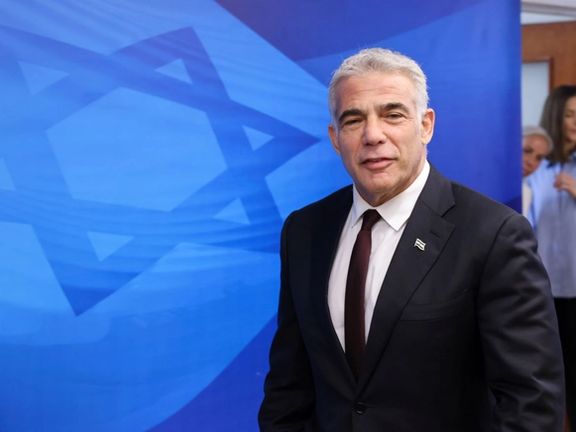
Britain and Israel will "work night and day" to prevent Iran from becoming a nuclear power, the foreign ministers of the two countries wrote in a joint article.

Britain and Israel will "work night and day" to prevent Iran from becoming a nuclear power, the foreign ministers of the two countries wrote in a joint article.
"The clock is ticking, which heightens the need for close cooperation with our partners and friends to thwart Tehran's ambitions," the UK's Liz Truss and her Israeli counterpart Yair Lapid wrote in the Telegraph newspaper on Sunday.
Lapid is visiting Britain in what Israeli media last week said is part of Israel’s diplomatic push to warn allies of the dangers of concessions to Tehran.
Israeli Prime Minister Naftali Bennett said earlier in the day that his country was "very worried" that world powers will remove sanctions on Iran in exchange for insufficient caps on its nuclear program, as negotiators convene in Vienna on Monday in a last-ditch effort to salvage a nuclear deal.
Meanwhile, Israel and Britain will sign a 10-year agreement on Monday to work closely on areas such as cybersecurity, technology, trade and defense, according to the Telegraph.
The foreign ministers added in the article that Israel will officially become Britain's "tier one" cyber partner, in a bid to improve its cyber defense as countries around the world face increased threats.
Report by Reuters
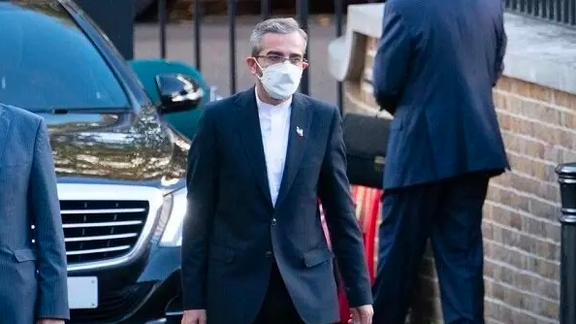
The heavy presence of financial officials in Iran's new negotiating team highlights Tehran’s focus on lifting US sanctions in talks starting in Vienna, Monday.
"Actions now matter more than mere words. We should be offered a clear and transparent mechanism to ensure that sanctions will be removed," Iran's chief negotiator, Ali Bagheri-Kani wrote in an op-ed in the Financial Times Sunday about Iran's approach to the talks in Vienna.
"We will be starting these new discussions under circumstances influenced by the unfortunate fate of the JCPOA," he wrote, referring to US president Donald Trump's decision to withdraw from the 2015 nuclear deal, the Joint Comprehensive Plan of Action, in 2018. Bagheri-Kani also emphasized that sanctions relief must be verifiable, and a guarantee should be offered that there will be no future withdrawal from any agreement reached between the parties.
The six-member team headed by Ali Bagheri-Kani will resume the talks Iran suspended in June, two days after the presidential elections that brought hardliner Ebrahim Raisi to power. The new team insists that all sanctions imposed after 2018, which include sanctions related to human rights, support for terrorism and money laundering, have to be lifted in addition to nuclear sanctions.
Austrian journalist Stephanie Liechtenstein said in a tweet that Iran's delegation that arrived in Vienna Saturday is very large with up to forty members.
The presence of "prominent experts and officials involved with the phenomenon of unjust sanctions in recent years" and the new team's "considerable differences" with the negoting team in the previous administration demonstrates Iran's resolve for a "clear-cut and complete political and economic agreement," the official news agency (IRNA) wrote Sunday.
The new team consists of Reza Najafi, deputy foreign minister for legal and international affairs and Iran's former envoy to the IAEA. The rest are banking and financial experts: Ebrahim Shaybani, former Central Bank governor, Gholamreza Panahi, Central Bank deputy governor for international affairs, Ali Fekri, deputy economy minister and head of the Investment Organization, Ahmad Asadzadeh, caretaker of oil ministry's international and trade department, and Mehdi Safari, the economic diplomacy deputy of the ministry of foreign affairs.
Nearly all the team's members have also served as envoys or representatives to international organizations in the past.
Since June, Iran has vastly expanded its stockpile of 60-percent enriched uranium which according to Iran's nuclear chief Mohammad Eslami has now reached 25kg.
Given that 15kg of 90% enriched uranium is needed to build a nuclear bomb, Iran could be a month away from acquiring enough fissile material, the Revolutionary Guards (IRGC) affiliated Fars news agency said in a commentary Sunday. But it added that this assumption based on "Western logic", while Iran's nuclear program is peaceful and claimed that it continues to be supervised by Non-Proliferation Treaty (NPT) safeguards.
Iran and the UN nuclear watchdog IAEA failed to reach an agreement over monitoring of nuclear sites during IAEA chief Rafael Grossi's visit to Tehran last week.
Western powers may suggest in the new round of talks, Fars said, to offer Iran the easing of oil sanctions in return for stopping its 60% enrichment and allowing IAEA to resume its inspections within the framework of NPT's Additional Protocol the voluntary implementation of which Iran has stopped.
The news agency that often reflects the views and positions of the IRGC argued that such an offer and an interim agreement could only be considered if "Iran's presence in the oil market" was "guaranteed".
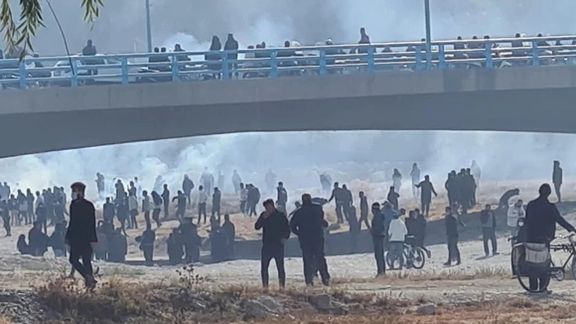
Hardline media in Iran claim that the United States instigated protests in Esfahan to put pressure on Tehran ahead of nuclear talks set to resume on Monday.
Ultra-hardliner Kayhan daily, financed by Supreme Leader Ali Khamenei Sunday claimed, "America's foot soldiers" perverted farmers’ water protest in Esfahan on Friday to "sow unrest and reap sanctions" ahead of Vienna nuclear Talks.
The newspaper claimed in a commentary that Western powers always incite unrest in Iran to "impair the resilience" of the regime and the people against US sanctions to force the regime to return to negotiate over its nuclear program.”
Farmers had been protesting in Esfahan city center for two weeks demanding their traditional water rights from the Zayabdeh Roud river, which has been mostly dry in the past decade. The call to protest on Friday came after security forces stormed the farmers' makeshift camp in the dry riverbed in the early hours of Thursday and burned their tents. Social media reports said they were given fifteen minutes by security forces to leave their tents before they went up in flames.
As people gathered on Friday to continue the protest, Security forces used tear gas, batons and pellet shots to disperse protesters whose slogans grew more and more anti-governmentlater in the day with many chanting slogans against Supreme Leader Ali Khamenei, clerical rule, and security forces.
Kayhan claimed that farmers were not involved in the Friday protests, which it said were hijacked by "paid thugs". Farmers had ended their protest on Wednesday and stayed away from the Friday protests, Kayhan claimed.
The newspaper is ardently opposed to negotiations with the West over Iran's nuclear program. In another commentary Sunday, the newspaper's chief editor, Hossein Shariatmadari, opposed any direct talks with US representatives in Vienna on Monday and said to avenge the blood of Iran's assassinated nuclear scientists including Mohsen Fakhrizadeh a year ago, Iran's envoys in the talks should continue to 'humiliate the US" by refusing direct talks.
The Revolutionary Guards (IRGC)-affiliated Fars news agency also claimed that farmers were not involved in the Friday protests. "It appears that ahead of the new round of talks for lifting sanctions, [US] democrats have once again resorted to their usual policy of "riot inside [Iran] and sanctions from outside to weaken Iran's position," Fars wrote.
The conservative Jomhouri Eslami newspaper in a commentary Sunday criticized the hardline media and called their claims a "distortion of truths". "Cracking down on people and then resorting to propaganda to distort the truth will not only fail to convince the public. It will damage people's trust in authorities and in the propaganda apparatus," it wrote.
"Deeply concerned about the violent crackdown against peaceful protestors in Isfahan. The people of Iran have a right to voice their frustrations and hold their government accountable," US State Department Spokesman Ned Price tweeted Saturday.
Videos posted on social media Friday showed thousands of protesters in the city's dry riverbed and its adjacent boulevards chanting slogans peacefully and refusing to leave despite heavy use of tear gas, firing guns in the air and paramilitary and plainclothes motorcyclists driving into crowds. As the day grew, however, reports said security forces heavy-handedly suppressed the demonstrations that had spread to nearby boulevards. Some protesters threw stones at anti-riot forces.
Iranian authorities invariably blame "thugs and hooligans" for any antigovernment protest. "It was the police who did this, don't go and claim later that they were thugs and hooligans," a wounded old man, apparently one of the farmers said in one of the videos from Esfahan protests.
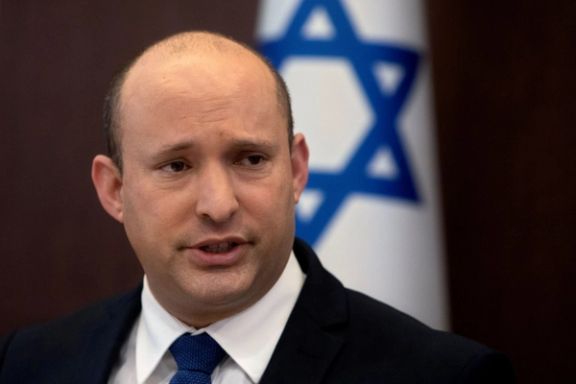
Israel worries Iran will secure a windfall in sanctions relief in renewed nuclear talks but will not sufficiently roll back its bomb-making potential, Israeli Prime Minister Naftali Bennett said on Sunday.
Negotiators will convene in Vienna on Monday in a last-ditch effort to salvage a nuclear deal which the United States under then-President Donald Trump quit in 2018, reimposing sanctions on Iran. That led to breaches of the deal by Tehran, and dismayed the other powers involved.
Israel, which is not a party to the talks, opposed the original 2015 pact as too limited in scope and duration. Israeli leaders have long threatened military action against Iran if they deem diplomacy a dead end for denying it nuclear weaponry.
"Israel is very worried about the readiness to remove the sanctions and to allow a flow of billions (of dollars) to Iran in exchange for unsatisfactory restrictions in the nuclear realm," Bennett told his cabinet in televised remarks.
"This is the message that we are relaying in every manner, whether to the Americans or to the other countries negotiating with Iran."
Few expect a breakthrough in the talks as Iran's uranium enrichment activities have escalated in an apparent bid to gain leverage against the West.
Reporting by Reuters
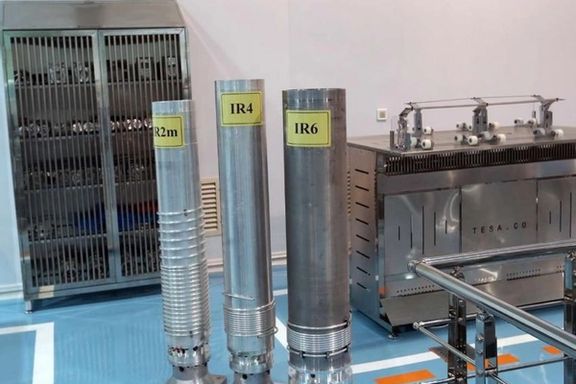
The United States and its partners are likely to exert pressure on Iran if it uses talks in Vienna to accelerate its nuclear program, the US said on Saturday.
"If Iran thinks it can use this time to build more leverage and then come back and say they want something better it simply won't work. We and our partners won't go for it," US Special Envoy for Iran, Robert Malley, told the BBC News Hour.
But Iran has already built leverage, according to Fars news agency in Tehran affiliated with the Revolutionary Guard. In an article signed by a writer with hardliner credentials on Sunday, questioning an interim or partial deal, the hardline media outlet said that Western estimates of Iran being a few weeks away from having enough enriched uranium for a bomb are true.
Indirect nuclear talks between the United States and Iran, with the participation of major powers, resume on Monday after a five-month hiatus, while the idea of an interim deal has been mentioned in recent days. Iran has rejected the idea, but the Fars article leaves the door ajar.
It seems that negotiations have already started even before the first meeting convenes in Vianna. "If that's Iran's approach, which is to try to use the negotiations as cover for an accelerated nuclear program, and as I say, drag its feet at the nuclear table, we will have to respond in a way that is not our preference," said Malley, who heads up the US negotiating team. "Nobody should be surprised if at that point there is increased pressure on Iran.
"We hope not to get that there, but if we are, then pressure will have to increase to send a message to Iran that the choice it is making is the wrong one. That it has a different path available to it, but it's not a path open indefinitely because Iran's nuclear program is putting the very essence of the deal negotiated (in 2015) at risk," he said.
But Fars said in its article that the West has few tools to exert more pressure on Iran, given the energy crunch in the world, arguing that some countries are willing to clandestinely buy oil from Iran.
Fars also said that the West is clearly concerned about advances Iran has made and its decision to restrict monitoring by UN’s International Atomic Energy Agency (IAEA). That is why they are eager for a partial agreement that would stop Iran’s higher-degree uranium enrichment in exchange for reduction of sanctions on Iran’s oil exports. But the US is not willing to provide permanent guarantees that reduced sanctions would not be reversed in the future, Fars argued.
The article went on to say that interim or partial agreements in Iran’s 18-year nuclear talks with the West is not a new idea and was tried before with mixed results, and will not work in this case. Iran has been demanding the full removal of all US sanctions imposed since 2018 and if Tehran accepts an interim deal, it will mean it buckled under the pressure of sanctions.
But the Fars article does not reject the idea of an interim deal altogether and says, “If the West is willing to make serious concessions over Iran’s oil sales and the repatriation of the proceeds, it might be possible to theoretically consider [an interim deal], provided that Iran’s presence in the global oil market is guaranteed.”
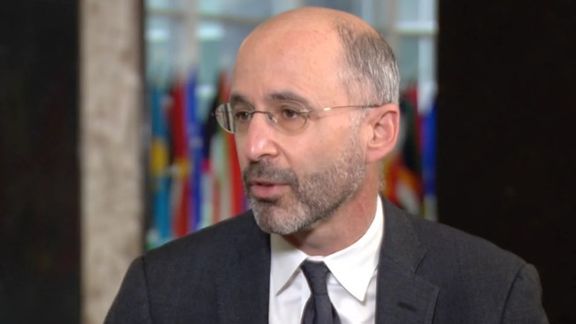
Talks resume in Vienna between Iran and world powers Monday after a five-month gap with scant optimism of reviving the 2015 deal limiting Tehran’s atomic program.
Since previous United States president Donald Trump pulled the US from the agreement in 2018, Washington has imposed ‘maximum pressure’ sanctions while Iran has since 2019 expanded its nuclear program beyond JCPOA limits.
The US presidential envoy on Iran, Robert Malley, told US public radio (NPR) this week that he was waiting to see what the new Iranian negotiators appointed by president Ebrahim Raisi (Raeesi) would “say when they’re at the table” when the Vienna talks resume.
“Obviously the indications they've given − and we're not the only ones who've heard those indications − are not particularly encouraging,” Malley said.
The envoy criticized Iran’s expressed desire for American guarantees that it would not withdraw once again from the deal, once renewed: “If those are the kinds of demands they make, that's tantamount to saying, we don't really want a deal; we just want to spend the next few months building our nuclear program.”
Plan B
NPR also interviewed Michael Singh, a senior security official in the George W Bush administration, who argued that the Biden administration − which came to office committed to reviving the JCPOA but has continued maximum pressure sanctions and introduced new ones − needed a ‘plan B’.
Malley told NPR only that the US was looking at “other efforts – diplomatic and otherwise” to curb Iran’s nuclear program. He said that if Tehran started “getting too close, too close for comfort [to capacity to make a weapon], then, of course, we will not be prepared to sit idly by.”
The administration of President Joe Biden is under domestic pressure with its popularity falling since the August withdrawal from Afghanistan. Some top Democrats in Congress are lukewarm at best and nearly all Republicans strongly opposed.
Formal talks in Vienna are between the remaining members of the JCPOA – China, France, Germany, Iran, Russia and the United Kingdom – so adding the complication that the US delegation in the Austrian capital takes part only indirectly.
Russia, China, Europe
Russia and China have called on both the US and Iran to return to the JCPOA, while insisting there is special onus on Washington as the party that left the agreement, even after it voted in favor at the United Nations Security Council.
While the three western European states’ position is formally similar to Russia and China – calling on both Washington and Tehran to adhere to the JCPOA – the E3 has expressed growing concern at the expanding Iranian nuclear program and at Iran’s limiting its cooperation with the International Atomic Energy Agency (IAEA) to that required under the Nuclear Non-Proliferation treaty (NPT).
The E3 told the IAEA board meeting this week that the Iran’s atomic activities, especially enriching uranium to 60 percent and using more advanced centrifuges, was “irreversibly reducing the counter-proliferation value of the JCPOA.”
Russia in contrast played down concerns over Iran expressed by IAEA chief Rafael Mariano Grossi. Moscow’s IAEA ambassador Mikhail Ulyanov said these were a “constant irritant” but had “little practical meaning in terms of proliferation risks.” Ulyanov accepted that while these issues needed to be “clarified and closed” the real challenge was restoring the JCPOA.
GCC, Israel
The Gulf Cooperation Council, in a statement from its Iran working group November 17, supported a return to the JCPOA, moderating its past opposition. The GCC said renewal would “help pave the way for inclusive diplomatic efforts to address all issues that are necessary to ensure sustainable safety, security and prosperity in the region.”
But Israel has maintained strong opposition to JCPOA revival. Defense Minister Benny Gantz said this week that any Iran agreement should restrict its missile program and regional alliances. Gantz emphasized his government’s commitment to “build our military might,” which Israeli media reported led to $1.5 billion allocated October for preparations to attack Iran.